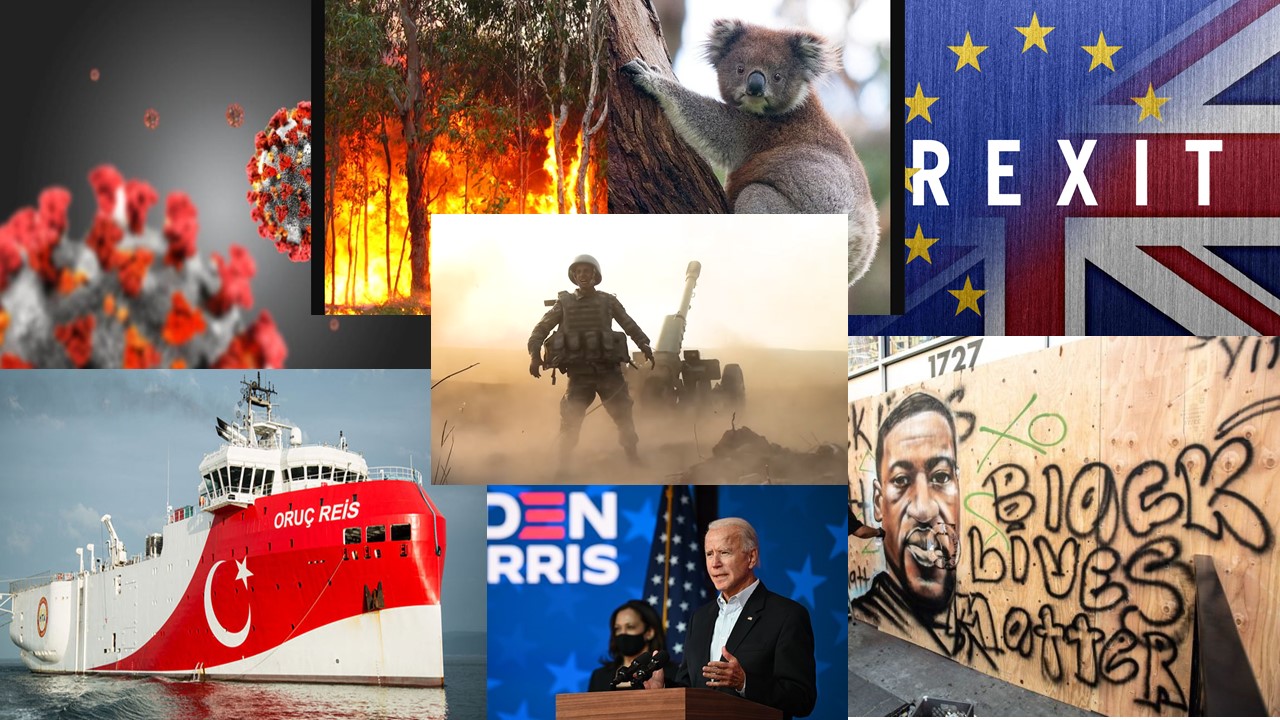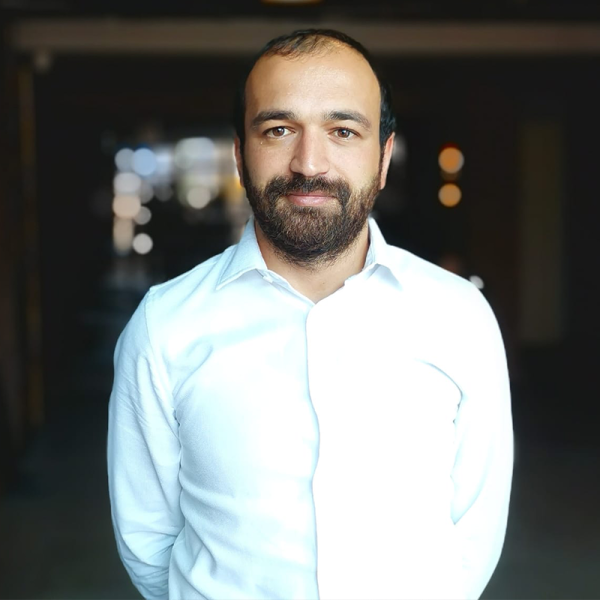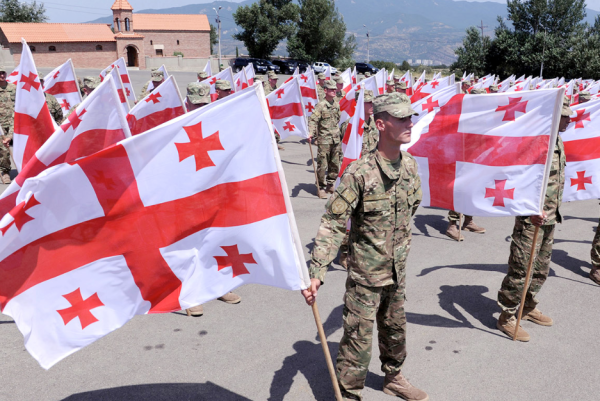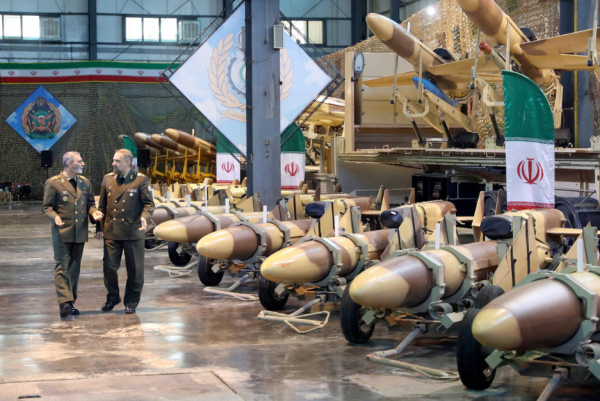Someone opened Pandora’s box: Seven major global events of 2020

2020 was the year of the rat, a symbol of fertility and abundance, according to the Chinese calendar. When people asked for an abundance of the things in their new year wishes in December 2019, they, definitely, did not mean abundance of this kind. 2020 became the year of myriad troubles and anxiety for humankind and escalated geopolitical confrontations. Yet there were certain positive developments as well. Worthwhile to mention that some global events of the year were remotely predictable and there were continuities, in this respect and the others were mainly unpredictable and caught many unprepared; however, they accelerated intensity of predictable ones. So here are our major seven global events of 2020.
Covid-19 pandemic. Unfolded in December 2019 in Wuhan, the most populous city in Central China, it took a couple of months for the disease to spread all over the world. Suddenly, the world found itself in the novel of Albert Camus, The Plague, in which few have an idea what is awaiting us, “…or what will happen when this all ends.” What is known is “…there are sick people and they need curing.” The pandemic was followed by the suspension of free movement of people across the globe and the increasing role of the digital economy and digital life due to lockdowns.
Caught many unprepared, according to UNDP, the COVID-19 pandemic is “the defining global health crisis of our time and the greatest challenge we have faced since World War Two.” More than an ordinary health crisis, the pandemic has also brought a lot of psychological, economic, and inter- and intra-state political consequences.
In a study published by QJM: An International Journal of Medicine, researchers report “a higher prevalence of subjects with psychological symptoms, emotional disturbance, depression, stress, mood alterations and irritability, insomnia, posttraumatic stress symptoms, anger and emotional exhaustion...”
As the pandemic restricted global economic activities, the oil demand slumped dramatically in February. Energy markets hit by Russian and Saudi Arabian bet amid OPEC+ talks in March further. For the first time in history WTI crude oil futures collapsed to negative prices. Due to the pandemic, Statista had forecasted that global GDP growth was going to be -4.5% in 2020. The International Labour Organization had predicted that 400 million jobs could be lost.
Locking down the country and restricting social activities created many challenges for policymakers in recent months. Some of the leaders could not pass the Covid-19 management test, including U.S. President Donald Trump. Italy and Czechia had unpleasant moments due to the alleged confiscation of hundreds of thousands of face masks by the Czech side. Besides, finding a vaccine became competition among major powers, not cooperation.
Wildfires. 2020 was also marked by uncontainable and catastrophic wildfires, which caused great damage to nature and people across different continents and climates.
Started already in late 2019 Australia’s wildfires fire season continued into 2020 burning millions of acres of the forest strips until the end of March. Ecologists from the University of Sydney estimated that “480 million mammals, birds, and reptiles have died due to the fires”. It is also said that around 8,000 koalas have burnt to death which is one-third of all of the koala population in New South Wales, Australia.
Greenpeace claims in 2020 wildfires burned “…an area larger than the size of Greece” in Siberia, Russia. Thousands of people were evacuated due to wildfires in 2020 in Sichuan province in Southwest China, Indonesia, Amazon in Brazil, Turkey, Ukraine, Florida and California, in Africa, and other parts of the world.
The forests are the lungs of the earth as they help the planet breathe by turning carbon dioxide into oxygen. They are also an air-conditioning system of our earth as they keep the planet cool. Continuing climate disruptions play out role in unfolding uncontainable wildfires, studies show. Scientists believe that climate change is altering the nature and intensity of the fires, as well as increasing the fire season and size of areas affected by fire. The vanishing of the forests at an alarming rate contributes to global warming. Global Landscapes Forum estimates that “Increasingly hot climate will provide the conditions necessary for extreme fires to happen more frequently” in the years to come.
George Floyd. The killing of George Floyd under the police brutality has reminded American citizens that Martin Luther King’s dreams are still among the pending issues in the U.S. The American nation does not even now “…live out the true meaning of its creed…” of self-evident equality of all men and “the life of the Negro is still sadly crippled by the manacles of segregation and the chains of discrimination”. Following the murder, decentralized Black Lives Matter movements that have criticized racism and discrimination against blacks in the U.S. since the 2010s inflamed in the various public spaces of the U.S.
Black Lives Matter movements went far beyond the boundaries of the U.S. and reverberated across the globe. Thousands took to the streets to raise awareness and to protest racial inequalities in their own societies in Canada, Europe, Africa, Brazil, and other corners of the world despite strict Covid-19 lockdown measures. The unfortunate event stirred up the memories associated with racially motivated violence and systematic discrimination against black people and any other related bigotry and intolerances, including migrant tragedy lived in the deep waters of the Mediterranean.
Some 10,000 people joined the protests in Brussels. The colonial past of Belgium, the statues of Leopold II, and other key figures in Belgian history were brought to the forefront of the debate. While the petition targeting the removal of statues glorifying the colonial history had surpassed 50,000 signatures in Belgium, President Macron insisted that France is not preparing to raze statues of colonial-era figures, though the country has pledged to remain uncompromising in the face of racism.
Geopolitics. In 2020 the Black Sea, the South Caucasus, Mediterranean, Middle East, Gulf turned into the galvanized zones of geopolitical confrontations. Whilst status quo powers tended to retain and consolidate their holds, revisionist and expansionist powers were on the quest of the opportunities that arose in light of a changing security environment.
As 2020 started, Iran-U.S. tensions flared in Iraq and the Persian Gulf. On 3 January 2020, a United States drone near Baghdad International Airport killed Iranian major general Qasem Soleimani known as the architect of Iran’s clandestine operations in the Middle East. Iranian-backed militia responded over the next months with rocket attacks on American bases in Iraq. Tensions heightened again in April when Iranian boats threatened U.S. warships in the Persian Gulf.
Following the fierce confrontations and proxy war in Syrian and Libyan theatres, interesting dynamics of competition and cooperation between Russia and Turkey in the Black Sea, the South Caucasus and Central Asian regions persisted over 2020. While the EU and Russia frictions entered into a new stage after the manipulated presidential election in Belarus, Franco-Turkish, Greek-Turkish, Egyptian-Turkish and U.S.-Turkish tensions were on the rise in the Mediterranean Sea due to Turkey’s activities around its The Blue Homeland Doctrine and Turkey’s purchase of Russian-made S-400 air defense system.
Signed by Israel with United Arab Emirates and Bahrain, Abraham Accords embodies a major shift in Middle Eastern geopolitics. Besides, Isreal and Turkey’s intelligence services recently had several secret talks after a decade-long strained relations. Following the talks, Turkey appoints a new ambassador to Israel, who were withdrawn due to the attacks against Palestinians in Gaza Strip in May 2018.
Biden. The Democratic nominee Joe Biden won the election in the U.S. that took place on 3 November 2020. The handling of the Covid-19 pandemic and the economy as well as racial issues were determining factors influencing voter’s preferences.
Many predicts that the election will have far-reaching consequences. Because during his campaign Biden signaled if he won the election, the U.S. would return to the center of global affairs. It is expected that Biden’s administration will potentially seek to extend the agreement with Russia on the New Strategic Arms Reduction Treaty (START), resume U.S. support for the World Health Organization, rehabilitate trans-Atlantic relations and the American alliance with South Korea and Japan that damaged during the Trump era, and re-join the Paris Climate Accords.
The EU and Iran are also hopeful that Biden’s administration will bring the Iranian Nuclear deal back to life. Yet it is contentious that whether Biden will stick to the old agreement or will ask for new commitments from Iran such as stopping Tehran’s support for militias in the Middle East.
China-U.S. relations, Biden and Trump’s Abraham Accords, and Biden and Macron’s Grand Project are also at the forefront of the debates. Experts believe there will not be major shifts in the U.S. stance toward China. Biden is also expected to abide by the deal signed between Isreal and some Arabian countries. As says foreign policy columnist Michele Barbero, “France is going to have a harder time selling “strategic autonomy” without the foil of the Trump administration to drive it”.
Nagorno-Karabakh. The only country that really had a good year was Azerbaijan, many argue. When the world countries were busy with their internal challenges and agendas, Azerbaijan and Armenia went to war over Nagorno-Karabakh which altered the decades-long no war, no peace situation between the neighbors. Azerbaijan eventually gained a remarkable victory and restored control in the majority of its internationally recognized territories that were occupied by Armenia in the mid-1990s.
The Second Nagorno Karabakh War is notable for a few reasons. The war reflects new geopolitical realities emerging not only in the South Caucasus region but also in the regions around Caucasus, the Black Sea, Middle East, and Central Asia. The evolving security architecture of the region is novel and complex in several aspects, as it involves regional powers such as Turkey, Russia, and Iran that were previously stationed in opposite poles.
The conflict also heralded the advance of modern warfare as Turkish-made Bayraktars and Isreal made kamikaze drones had a decisive role in ensuring Azerbaijan’s victory and displayed how the future wars would look like. Military experts say contemporary drones threaten the conventional warfare doctrines as it leaves ground forces and much-costlier equipment such as tanks and air defense systems highly exposed.
The humanitarian aspect of the Second Nagorno Karabakh War also should be noted. According to UNCHR, there are 80 million forcibly displaced people worldwide. The recent developments in the Nagorno-Karabakh against the backdrop of dozens of unresolved conflicts around the world send a positive message to the world that about 700,000 IDPs will be able to return home.
Brexit. It took the UK 4 years to leave the EU after the referendum. Although Britain officially left the EU on 31 January 2020, the parties kept a lot of things the same until 31 December 2020 to have enough time to agree to the terms of a new trade deal, which was reached on 24 December.
Some of the important provisions of the deal are the following: there will be no tariffs and quotas between the UK and the EU from 1 January; at borders safety checks and customs declarations will be introduced and the EU will impose restrictions on some animal products made in the UK; service sector in the UK will lose their automatic right of access to EU markets; recognition of professional qualifications is suspended; the UK leaves the European Court of Justice; UK nationals will need a visa for stays of longer than 90 days in the EU in 180 days; the UK stops its participation in the Erasmus exchange program.
Some believe Brexit will have wide-ranging repercussions as it will potentially create new dynamics in the political economy of the entire globe. There is already a small sign of it. Italy, Poland, Belgium, and Spain recently were upset by Germany’s drive for an EU-China investment agreement. According to Politico, one EU diplomat complained saying “Is this the way the EU will work post-Brexit? The Brits are just out and we’re already missing their open market-oriented approach." Besides, the divorce creates a negative precedent in the EU, as it was the first time that an EU member state has departed the Union since its establishment. Whether the other EU members will follow the suit or not is an open question.
2021 is a year of the ox. A symbol of stability and equilibrium, according to the Chinese calendar. There are already some positive developments to be hopeful that the world will return to normalcy. Several vaccines have been approved by the World Health Organization and some countries have already launched vaccinations. Yet, it is far from certain to a great extent what awaits us in 2021. As Seneca said, ‘Whatever can happen at any time can happen today’ or throughout 2021. Thus, rather than being hopeful, it is better to be prepared.







